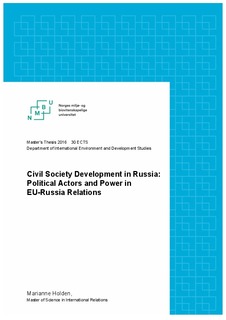| dc.description.abstract | This thesis examines non-state actors’ role in International Relations. To accomplish
this, the study has two objectives. The first objective is theoretical: to explain that
different dimensions of power must be included in studies on non-state actors. The
second objective is empirical: to show that non-state actors working on Russian civil
society must relate to different dimensions of power. The empirical data is based upon
participation and semi-structured interviews in the general assembly of the non-state
initiative EU-Russia Civil Society Forum. I have also interviewed a representative from
the European Economic and Social Committee. Additionally to the empirical data, have
I reviewed literature on power, EU-Russia relations and civil society. This thesis argues
that non-state actors must relate to power when working on civil society development in
Russia. The members of the Forum must relate both to Russian constrains on civil
society, and the political crisis between EU and Russia in the aftermath of the
annexation of Crimea. This influences the Forum in three ways. Firstly, it creates a
division among the members between pragmatists and principled views. Secondly, this
division is reflected in how the actors themselves act and relate to power. While
principled work to get international support to criticize the Russian authorities for the
repressive laws on civil society, the pragmatists favor a more subtle form of power
aiming to change the anti-Western discourse inside Russia today. Thirdly, in light of the
political crisis between EU and Russia the Forum has received increased attention from
the EU. In that respect the members in the Forum are becoming increasingly political,
which again challenges their work in Russia. The Forum faces several obstacles in
regards to the current crisis between EU and Russia, nevertheless it still provides a
common space where civil society actors can meet and interact. This common space is
how the Forum supports civil society activity in Russia despite the ongoing repression.
The future will tell if this common space will continue to exist in the shadow of
geopolitical crisis between the neighboring countries. The only point that is clear is that
non-state actors also in the future must continue to relate to several dimensions of
power. | nb_NO |

